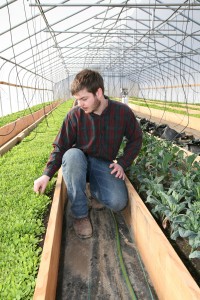
Those apples you buy at your local organic farm may not have the smooth, glossy look of those displayed in supermarkets ”“ but they also aren”™t bombarded with pesticides to “debug” them. To Josh Morgenthau, that”™s the joy of organic farming, one he”™s hoping to expand on the family”™s farm.
At Fishkill Farms, former New York City District Attorney Robert Morgenthau”™s son has taken charge of the farm his grandfather bought at the turn of the 20th century; 270 acres of rolling farmland that stand apart from its busy surroundings. In the distance, IBM Fishkill is visible, as are many mass-scale developments. But this piece of Dutchess County remains untouched, and Josh Morgenthau is committed to his renewed agricultural roots.
Morgenthau spent many years visiting his grandparents in Fishkill, and when his father inherited it, it continued operations under a manager. When the manager died, Morgenthau was faced with a dilemma: sell the farm or poll the family to see if any of his children were interested in agriculture.
One son, Josh, who attended Yale and was on his way to a career in the arts, turned his attention to the family”™s homestead, deciding that farming ”“ and the years he spent helping his grandparents grow vegetables, fruits and raise chickens ”“ had enough pull to bring him back to the land.
He also brought new ideas his grandfather probably hadn”™t dreamed of when he first bought the Fishkill property. While pesticide-free farming may have been in vogue more than 100 years ago, selling vegetables and fruits ahead of the growing season was not part of the farmers”™ equation then.
Josh Morgenthau, like many of today”™s farmers, created a community supported agriculture (CSA) group, one that buys the bounty the farm will grow during the upcoming season ”“ or conversely, share the loss if Mother Nature fails to cooperate.
“It”™s a way farmers can meet the costs of farming and at the same time, families can be guaranteed first pick of fresh produce, fruits and berries,” Morgenthau said. “It”™s another way the consumers ”“ who are increasingly concerned about what they are consuming ”“ have access to fresh fruits and vegetables and to know where they are grown and harvested.”
The CSA provides the bounties of the harvest ”“ from early spring garlic snapes to strawberries, tomatoes, peaches, squash and corn ”“ throughout the year. Morgenthau says a share in the CSA, which can run as high as $900 depending on how often you want to receive your portion of the harvest, is usually split between two or three families.
“Essentially, when you break down the cost, to come each week or every other week and pick up a supply of green beans, arugula, strawberries, cherries or one of the many other fruits and vegetables we grow here, cost about $20 a week for a family,” he said. “If you sit down and calculate how much you are spending in the supermarket on produce, you are getting more than your money”™s worth. You”™re getting vegetables and fruit fresh from the farm that haven”™t been trucked in from California or flown in from South America.”
The young farmer is also working to harvest organic apples.
“Yes, it”™s a challenge. They are typically difficult to grow without pesticides, but we”™ve been experimenting with organic sprays that aren”™t harmful to humans, but keep the insects away. These apples don”™t look like the ones you”™ll see in the store ”“ perfectly shaped and colored ”“ but they will be tasty and fresh and not sprayed with chemicals that could compromise your health.”
Morgenthau is cultivating about 50 acres of organic apples and hopes to expand the apple orchards as he solidifies his technique.
One of the ways he”™s reducing the insect population is by letting the farm”™s 400 egg-laying hens free-range around the apple orchards. “They love to eat bugs.”
While all”™s quiet right now and seedlings are growing in hothouses, Morgenthau said the farm is extremely busy during the season. “We have pick-your-own berries and fruits, as well as a new cider room operating next fall, and we typically employ at least 30 local teens during the season and six full-time workers year-round.
A new barn, approximately 15,000 square feet, will feature a cider-press, where visitors can watch apples turned into juice.
Morgenthau acknowledged the high prices residents are finding in supermarkets ”“ and even at farmers”™ markets in the past year.
“Locally, it can have a lot to do with what kind of year you”™ve had. If the weather is good, you”™ll have a great season and perhaps have an excess and be able to sell at lower prices. On the other hand, costs for farmers have gone up all over. For those who are bringing produce in from other states, the cost of shipping and gas prices are definitely affecting the price you pay at the store.
“The advantage of doing your produce shopping at local farms is you are buying it freshly picked. You can”™t say the same about lettuce being trucked in from western states. Yes, it”™s easier to grab what you need off a shelf. But it doesn”™t taste as good or is as healthy for you … and it is a comfortable feeling to know exactly where your food”™s come from.”
Morgenthau doesn”™t get much painting done at the farm. “I have to go to visit my parents down in the city to do any artwork. … they come up and visit every weekend and I can go down there and paint. ..it works out well for all of us.”
With that, Morgenthau went back into the office behind Fishkill Farm”™s market, where a pile of papers waited for him on his desk ”“ and several hothouses demanding attention. “That”™s the downside of being your own boss. … when you live where you work, you never stop working. You have to literally leave home to get time off.”



















